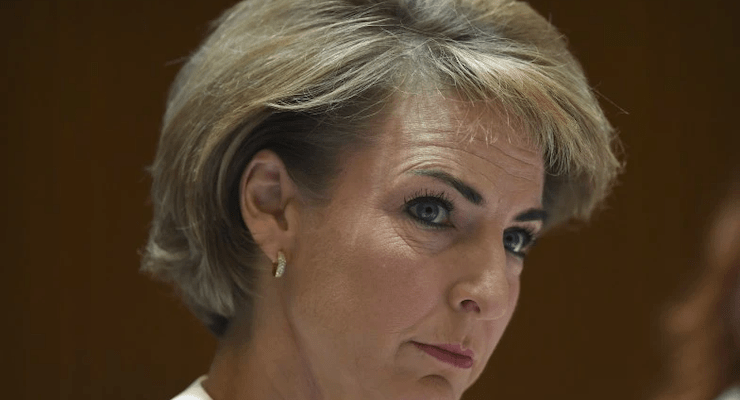
Australia’s first freedom of information commissioner in seven years was appointed to the role despite not officially applying for it, after the Coalition government bypassed the job’s selection panel to name one of its own legal advisors.
Deputy chief general counsel at the Australian Government Solicitor Leo Hardiman was appointed as the FOI Commissioner in March this year by the Coalition government, two months before the federal election.
Crikey can reveal that Hardiman was hand-picked for the role by then attorney-general Michaelia Cash, despite having not applied for the role.
Hardiman has significant legal and public sector experience from the Australian Government Solicitor, where he formerly was deputy chief general counsel and national leader in the Office of General Counsel.
The Coalition had received 20 applications for the role and appointed a panel including the public service commissioner to make a recommendation. But this process was bypassed with the appointment of Hardiman according to an answer to a Senate question on notice provided by Attorney-General Mark Dreyfus.
“Mr Hardiman was not an applicant in the panel process,” Dreyfus said in the answer.
The 2021-22 federal budget allocated $1 million per year for the appointment of an FOI commissioner to sit within the Office of the Australian Information Commissioner (OAIC), the first time this role would be individually filled since 2015.
A selection panel was established to provide a recommendation to the attorney-general for the position. The panel included then Attorney-General’s Department secretary Iain Anderson, Australian Public Service commissioner Peter Woolcott and information commissioner Angelene Falk.
The panel received 20 applications and made a recommendation to the government, though it was Hardiman who was ultimately selected.
In his answer, Dreyfus revealed that Hardiman was appointed by the previous government using a clause under the APS Merit and Transparency Policy, under which a minister can opt not to accept a selection panel’s endorsement for a role, and can instead write to the prime minister seeking approval for an alternative person.
“The then-attorney-general wrote to the then-prime minister setting out the reasons for recommending the appointment of Mr Hardiman,” Dreyfus said.
The FOI commissioner job listing was made public in June 2021, with Cash announcing Hardiman’s appointment in late March 2022.
In 2020 Hardiman was awarded the Public Service Medal for “outstanding public service through the provision of legal services to the Commonwealth”.
Hardiman took on the commissioner role at a time when the office had an unprecedented workload in terms of freedom of information review requests.
While the OAIC increased its finalised cases by 35% in the last financial year, the number of reviews it received increased by 60%.
The office now has more than 2000 FOI cases on hand, and more than 1000 of these have been under review for more than a year.
Addressing Senate estimates earlier this month, Hardiman said the office needs more funding to adequately complete its role.
“In my view, taking into account the current backlog and the rate of inflow of IC review applications to the office … there are not sufficient resources,” Hardiman said.
Dreyfus and Cash were both approached for comment.








Thank God we are free of this rorting, lying, self-serving sewer-dwelling Liberal Government.
Bring on the Federal Anti-Corruption Commission.
Theres no end to the LNP rorts. Need that ICAC. Need some politicians in jail ASAP.
Federal ICAC, when?
While there’s plenty to keep such a body busy for several years, if we ever get one it is unlikely to spend any time looking at how a minister used powers clearly given to the minister by the relevant legislation or related rules. This may well be a bad use of the power granted by “a clause under the APS Merit and Transparency Policy, under which a minister can opt not to accept a selection panel’s endorsement for a role, and can instead write to the prime minister seeking approval for an alternative person,” but nothing suggests it could be corrupt or improper when such a rule exists and it would be a waste of time and resources for a federal integrity body to investigate.
The problem here, as in many other instances, is that parliament keeps passing legislation that gives ministers the discretion to do things like this. MPs should know better, in theory it is their job to stand over ministers and keep them in check, but instead the governing majority of MPs always puts party loyalty first and never hesitates to pass laws that let ministers run amok with impunity. The opposition parties seldom object either since they look forward to doing the same when in government.
But if the “… the relevant legislation or related rules.” are open to abuse by a Minister they clearly need to be changed via recommendations via an ICAC review process, that is transparent and open / accessible to the public. This type of “bottom up” approach was championed by aspiring crossbenchers before the last election, endorsed by voters. There also needs to be other changes – for instance we can learn from the less corrupt Nordic countries where “…disclosure of budget information closes the door to waste and misappropriation of public funds. Therefore, countries should seek to promote information disclosure as well as enhance citizens’
participation throughout the budget process. The Open Budget Index shows that Sweden allows citizens to assess how their government is managing public funds.
Codes of conduct for public servants. Denmark obliges ministers to monthly publish information on their spending travel and gifts
Legal framework criminalising a wide range of corruption related abuses and an independent and efficient judiciary.”
https://www.transparency.org/en/blog/what-makes-new-zealand-denmark-finland-sweden-and-others-cleaner-than-most-countries
Yet there are people out there everyday defending this behaviour. It is time all political parties started to act in the interest of the country and not themselves and their supporters.
Thank God they were voted out.
That dreadful AG was one of the worst LNP featherbedders
She was not much good in any other role that she had!
Ultimate brown nose.